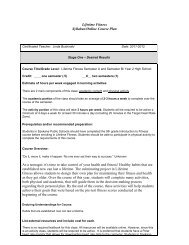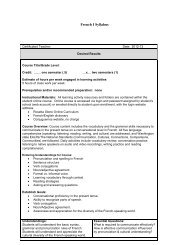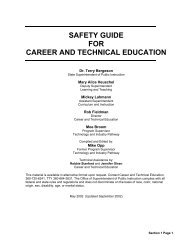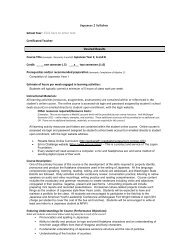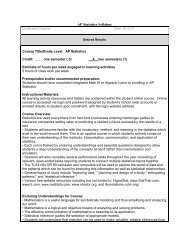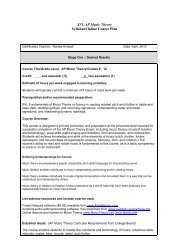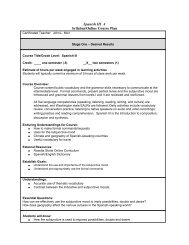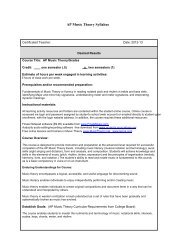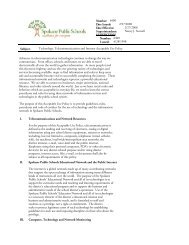Science 9A Physics Syllabus.pdf - Spokane Public Schools
Science 9A Physics Syllabus.pdf - Spokane Public Schools
Science 9A Physics Syllabus.pdf - Spokane Public Schools
You also want an ePaper? Increase the reach of your titles
YUMPU automatically turns print PDFs into web optimized ePapers that Google loves.
INQB - Scientific progress requires the use of various methods appropriate for answering different kinds of<br />
research questions, a thoughtful plan for gathering data needed to answer the question, and care in<br />
collecting, analyzing, and displaying the data.<br />
INQC - Conclusions must be logical, based on evidence, and consistent with prior established knowledge.<br />
SYSB - Systems thinking can be especially useful in analyzing complex situations. To be useful, a system needs<br />
to be specified as clearly as possible.<br />
Motion: PS1C - An object at rest will remain at rest unless acted on by an unbalanced force. An object in<br />
motion at constant velocity will continue at the same velocity unless acted on by an unbalanced force.<br />
(Newton’s First Law of Motion, the Law of Inertia)<br />
INQB - Scientific progress requires the use of various methods appropriate for answering different kinds of<br />
research questions, a thoughtful plan for gathering data needed to answer the question, and care in collecting,<br />
analyzing, and displaying the data.<br />
INQC - Conclusions must be logical, based on evidence, and consistent with prior established knowledge.<br />
SYSB - Systems thinking can be especially useful in analyzing complex situations. To be useful, a system needs<br />
to be specified as clearly as possible.<br />
Forces: PS1D – A net force will cause an object to accelerate or change direction. A less massive object will<br />
speed up more quickly than a more massive object subjected to the same force. (Newton’s Second Law of<br />
Motion, F=ma)<br />
INQB - Scientific progress requires the use of various methods appropriate for answering different kinds of<br />
research questions, a thoughtful plan for gathering data needed to answer the question, and care in collecting,<br />
analyzing, and displaying the data.<br />
INQC - Conclusions must be logical, based on evidence, and consistent with prior established knowledge.<br />
SYSB - Systems thinking can be especially useful in analyzing complex situations. To be useful, a system needs<br />
to be specified as clearly as possible.<br />
Work: PS3A - Although energy can be transferred from one object to another and can be transformed from<br />
one form of energy to another form, the total energy in a closed system remains the same. The concept of<br />
conservation of energy, applies to all physical and chemical changes.<br />
INQB - Scientific progress requires the use of various methods appropriate for answering different kinds of<br />
research questions, a thoughtful plan for gathering data needed to answer the question, and care in collecting,<br />
analyzing, and displaying the data.<br />
INQC - Conclusions must be logical, based on evidence, and consistent with prior established knowledge.<br />
SYSB - Systems thinking can be especially useful in analyzing complex situations. To be useful, a system needs<br />
to be specified as clearly as possible.<br />
APPC - Choosing the best solution involves comparing alternatives with respect to criteria and constraints,<br />
then building and testing a model or other representation of the final design.<br />
APPD - The ability to solve problems is greatly enhanced by use of mathematics and information technologies.<br />
Grading Scale:<br />
100-90 A<br />
89-80 B<br />
79-70 C<br />
69-65 D<br />
64-Below F<br />
Students will know and be able to:<br />
Understand sound waves, water waves, and light waves using wave properties, including amplitude,<br />
wavelength, and speed. Understand wave behaviors, including reflection, refraction, transmission, and



